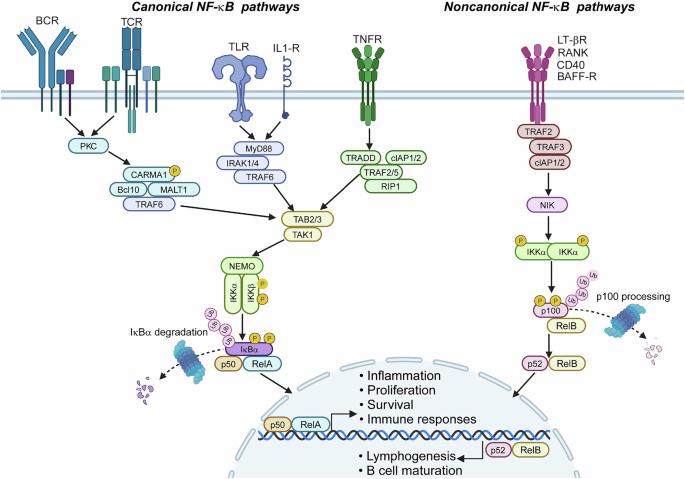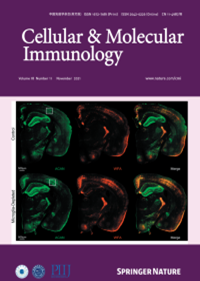NF-κB在炎症和癌症中的作用。
IF 19.8
1区 医学
Q1 IMMUNOLOGY
引用次数: 0
摘要
核因子-κB (NF-κB)是一个转录因子家族,可激活与广泛的生物过程相关的基因,包括免疫反应、炎症、细胞生长和存活。NF-κB激活异常导致急慢性炎症紊乱,主要是通过异常诱导编码促炎因子的基因和代谢紊乱。异常的NF-κB活化也影响调节性T细胞的发育和稳定性,参与自身免疫性疾病的发病机制。鉴于炎症在促进肿瘤发生中的关键作用,NF-κB的促炎作用也与癌症的发展有关。此外,异常的NF-κB活化导致肿瘤细胞增殖、存活、代谢、转移、肿瘤血管生成和治疗抵抗失控。NF-κB的这些病理功能突出了其作为炎症性疾病和癌症治疗靶点的潜力。在这篇综述中,我们总结了NF-κB在这些病理过程中作用的最新发现,并讨论了其潜在机制。我们还探讨了针对NF-κB通路的潜在治疗策略,并分析了可能面临的挑战。本文章由计算机程序翻译,如有差异,请以英文原文为准。

NF-κB in inflammation and cancer
Nuclear factor-κB (NF-κB) is a family of transcription factors that transactivates genes associated with a wide range of biological processes, including immune responses, inflammation, cell growth and survival. Dysregulated NF-κB activation contributes to acute and chronic inflammatory disorders, mostly through the aberrant induction of genes encoding proinflammatory factors and metabolic disorders. Abnormal NF-κB activation also influences the development and stability of regulatory T cells, contributing to the pathogenesis of autoimmune disorders. Given the critical role of inflammation in promoting oncogenesis, the proinflammatory role of NF-κB is also linked to cancer development. In addition, aberrant NF-κB activation contributes to uncontrolled tumor cell proliferation, survival, metabolism, metastasis, tumor angiogenesis and therapy resistance. These pathological functions of NF-κB highlight its potential as a therapeutic target for both inflammatory diseases and cancer. In this review, we summarize recent findings regarding the role of NF-κB in these pathological processes and discuss the underlying mechanisms. We also explore potential therapeutic strategies aimed at targeting the NF-κB pathway for disease treatment, along with an analysis of possible challenges.
求助全文
通过发布文献求助,成功后即可免费获取论文全文。
去求助
来源期刊
CiteScore
31.20
自引率
1.20%
发文量
903
审稿时长
1 months
期刊介绍:
Cellular & Molecular Immunology, a monthly journal from the Chinese Society of Immunology and the University of Science and Technology of China, serves as a comprehensive platform covering both basic immunology research and clinical applications. The journal publishes a variety of article types, including Articles, Review Articles, Mini Reviews, and Short Communications, focusing on diverse aspects of cellular and molecular immunology.

 求助内容:
求助内容: 应助结果提醒方式:
应助结果提醒方式:


